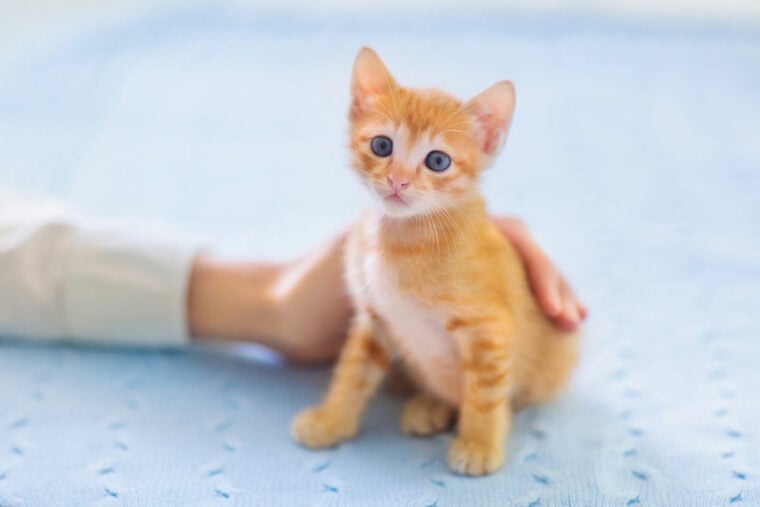
Click to Skip Ahead
If you have a cat that has given birth to kittens, it can be an exciting yet stressful time as you try to care for your pet without adding to her stress and anxiety. One thing you might wonder is when it is safe to hold the kittens. Most experts recommend waiting until they are about 2 weeks old, but keep reading as we look at the different stages of a kitten’s life and discuss how you can safely interact with them.
The Lifes Stages of Kittens
Early Development
During the first few weeks of a kitten’s life, they must receive proper care from their mother. This period is when they develop the necessary motor skills and build a strong immune system. Initially, kittens are born blind and deaf, relying solely on their sense of touch and smell. Their mother keeps them warm, feeds them, and teaches them essential behaviors.
Neonatal Stage
The neonatal stage, which lasts from birth until around 2 weeks, is critical for the kittens’ development. Most experts recommend minimizing human intervention and allowing the mother cat to bond with her offspring during this period. Frequent handling can cause stress and disrupt the bonding process. However, the American Society for the Prevention of Cruelty to Animals states that you can handle the kittens as soon as the mother allows it1. While it suggests contacting the vet before handling a kitten less than 1 week old, don’t wait any longer than 2 weeks.

Transitional Stage
After the neonatal stage, kittens enter the transitional stage, lasting 2 to 4 weeks. During this phase, their senses develop further, and they will start to explore their surroundings. You can begin handling your kitten carefully during this period, starting as soon as possible.
Socialization and Handling
Kittens become more active, playful, and curious between 4 and 8 weeks of age, and you should continue socializing them, gradually introducing them to more frequent human handling. Spend time near the kittens, talking softly to them and allowing them to approach you voluntarily. Offer treats or toys to create positive associations with you and other family members.

 Kitten-Holding Guidelines
Kitten-Holding Guidelines
Frequently Asked Questions
What Should I Do If a Kitten Doesn’t Want Me to Hold Them?
Unfortunately, not all kittens will enjoy it when you hold them. If a kitten shows signs of distress or resistance when being held, respect their boundaries. Forcing a kitten into your hands can cause them anxiety and potentially harm the bond that you are trying to establish. Allow the kitten to approach you voluntarily, and provide positive reinforcement with treats or toys. Gradually build their trust and comfort with gentle interactions over time.

Are There Any Precautions That I Should Take When Holding Kittens?
Yes, there are a few precautions to remember when holding kittens. Ensure that the environment is calm, quiet, and free from potential hazards. Avoid sudden movements or loud noises that can startle them. Be mindful of the duration of the handling sessions, starting with short periods and gradually increasing them as the kittens become more comfortable. Always monitor their reactions and adjust accordingly.
Why Is Socialization Important for Kittens?
Socialization is crucial for kittens because it helps them develop into well-adjusted and confident cats. Early socialization experiences with humans and other animals help kittens learn appropriate behavior, build trust, and develop positive associations. It contributes to their overall social skills, reduces fear and anxiety, and improves their ability to adapt to new environments and situations later in life. It will also make it more likely that your cat will get along with other cats and dogs in your home and make them more accepting of new animals that might arrive later.

Can I Hold a Kitten If the Mother Is Not Around?
Most experts recommend that you avoid separating kittens from their mother unless there is a compelling reason. The mother cat provides the kittens with essential care, nutrition, and socialization. If the mother is temporarily absent, it is best to wait for her return before attempting to handle the kittens. Seek guidance from a veterinarian or an animal welfare organization for advice about proper care and feeding if the mother is not present or unable to care for the kittens.
Can Children Hold and Interact With Kittens?
Yes, children can hold and interact with kittens under adult supervision. Teaching children how to handle kittens gently and respecting their boundaries is crucial. Supervision is necessary to ensure the children’s and the kittens’ safety, and the children will need to wash their hands before and after handling the kittens. Educating kids about the proper care and handling of cats can foster empathy, responsibility, and a positive relationship with animals in general.
Summary
You can start handling your kittens for 1–2-minute intervals in front of their mother when they reach about 2 weeks old, as long as they seem comfortable with it. Remember that all kittens develop differently. Some may be more open to handling than others. Wash your hands before and after handling them, monitor them carefully for signs of discomfort, and increase the length of your sessions as the kittens get more comfortable.
Featured Image Credit: FamVeld, Shutterstock






